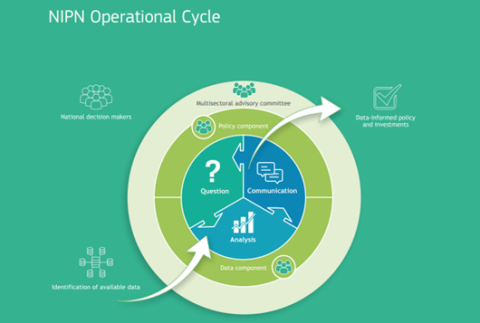Empowering Policy Decisions with Nutrition Data Analysis: The National Information Platforms for Nutrition (NIPN)
The National Information Platforms for Nutrition (NIPN) initiative was launched by the European Union in 2015 to support partner countries that are part of the global Scaling Up Nutrition (SUN) Movement. These countries have committed to delivering evidence-based programmes and interventions to improve nutrition in their progress towards the 2030 Agenda for Sustainable Development Goal 2 – to “end hunger, achieve food security and improved nutrition and promote sustainable agriculture”.
Thus, responding to the need to maximise the use of existing data while also creating the demand to fill data gaps, the main objective of the NIPN initiative is to generate country-led and country-owned information platforms for nutrition to strengthen national capacities in the analysis of nutrition information and data, providing policymakers with valuable insights for informed decision-making on policy, programs, and investments in nutrition.
The first phase of the initiative was implemented in nine countries: Bangladesh, Burkina Faso, Côte d’Ivoire, Ethiopia, Guatemala, Kenya, Lao PDR, Niger, and Uganda. To support implementation and coordinate technical assistance and capacity building, a Global Support Facility was established in 2015. From 2020 onwards, the Global Coordination Facility has been managed by Capacity for Nutrition (C4N), a joint action funded by the EU and the German Federal Ministry for Economic Cooperation and Development and implemented by Deutsche Gesellschaft für Internationale Zusammenarbeit.
Between 2021 and 2022, all NIPN platforms – except for Bangladesh, where the project closed in early 2022 because of shifting government priorities – have gradually entered the second funding cycle of the initiative, known as NIPN Phase II. In this new phase, GIZ provides technical and program management assistance in Ethiopia and Niger, while UNICEF supports Burkina Faso, Côte d’Ivoire, Kenya, Lao PDR, and Uganda. The Centro Agronómico Tropical de Investigación y Enseñanza (CATIE) delivers technical and program management assistance in Guatemala. In 2023, NIPN added a new partner country: Zambia.
Understanding how NIPN works
The NIPN platforms (NIPNs) are integrated into national host institutions and closely collaborate with national multi-sector coordination systems for nutrition. Each country's core NIPN team consists of two components – policy and data – jointly responsible for implementing the NIPN operational cycle.
The policy component involves convening a multi-sector advisory committee, formulating policy-relevant questions based on government priorities, interpreting data analysis in coordination with local partners and ensuring the strategic communication of actionable recommendations based on the findings.
The data component focuses on collecting multi-sector data in a central repository and analysing it to address policy-relevant questions. NIPNs require complex collaborations involving various stakeholders, including government ministries, researchers, technical and financial partners, to identify priority nutrition policy questions, gather necessary data, present evidence, and formulate strong recommendations for uptake.
The collaboration between mandated NIPN host institutions is formalised through contracts or memorandums of understanding linked to funding agreements with development partners.
To date, NIPN has contributed to improving the nutrition data environment in several countries by creating national data repositories for nutrition, increasing collaboration and synergies between sectors as well as answering questions for nutrition policy.
For more information, please contact Laura Barrington at laura.barrington@giz.de or read more HERE.
